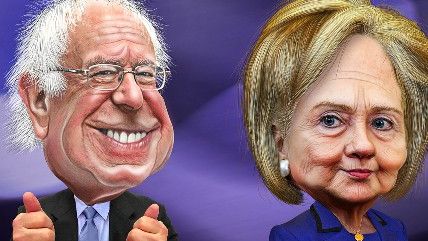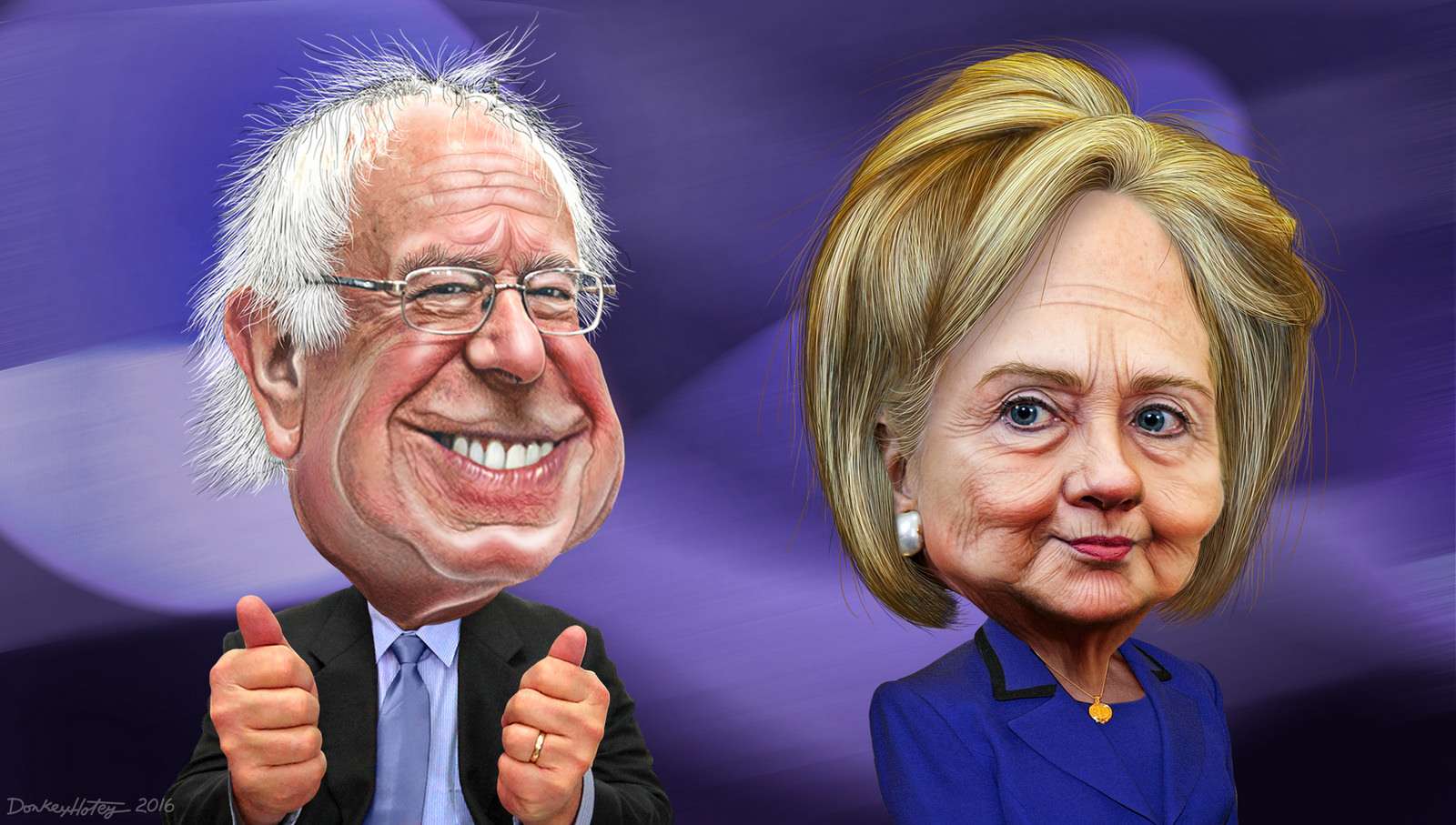Is Bernie Sanders Really Going "Scorched Earth" on Hillary Clinton or Is She Just a Terrible Candidate?
Democratic elites blame Sanders' protracted campaign for damaging Clinton, but she's her own worst enemy.


The conventional wisdom among staunch Democrats and much of the elite liberal commentariat is that the once-lovable insurgent campaign run by Vermont's most famous democratic socialist, Sen. Bernie Sanders, is well past its sell-by date, and that it's time for him to embrace "party unity" and convince his supporters to vote for Hillary Clinton.
The Washington Post's Eugene Robinson says he "shares much of Sanders' political philosophy" but that by keeping his word to his supporters that he will stay in the race until the nomination is clinched by someone (which means until the Democratic National Convention in July, because superdelegates don't cast their votes until then), Sanders is playing a "dangerous game."
Like Robinson, Slate's Jamelle Bouie describes Sanders' bucking of the establishment as a "scorched earth" endeavor. Also in the Post, Dana Milbank compares Sanders to that all-time Democratic boogeyman who had the audacity to challenge the two-party system: Ralph Nader.
The anxiety of mainstream Democrats will surely be exacerbated by Sanders' full-court press in California, where he continues to draw huge crowds, and where a primary victory for Sanders still wouldn't put him in reach of the nomination but would provide all the argument he needs to continue his efforts to radically transform the Democratic Party.
A recent article in the New York Times suggests that Sanders' "newly resolute attitude" is "the cumulative result of months of anger at the national Democratic Party over a debate schedule that his campaign said favored Mrs. Clinton; a fund-raising arrangement between the party and the Clinton campaign; the appointment of fierce Clinton partisans as leaders of important convention committees," among other things.
Sanders' deliberately outside-the-party-mainstream campaign intends to wring every last drop of legitimacy it can squeeze out of the primary process. Which is why in Kentucky the secretary of state agreed to his campaign's request for a recanvass of all the voting machines and absentee ballots in the state. In the best case scenario for Sanders, all this effort will net him is a single additional pledged delegate.
It's no secret that Sanders, his staff, and many of his supporters feel no sense of loyalty to a party he is only nominally (maybe?) a part of. Unsurprisingly, this makes party loyalists both angry and uncomfortable, because they need Sanders' legion of voters to stay within the party's tent and turn out on Election Day in November.
But what really makes Democrats nervous is that Sanders has revealed something they don't want to admit: Hillary Clinton is bad at political campaigning.
This is the fourth political campaign Clinton has run, but only the second time she's faced a challenger backed by a significant constituency. In 2000, she ran for Senate against Rep. Rick Lazio, who had to scramble his bid together rather late in the process after then-New York City Mayor Rudy Giuliani aborted his prospective run due to prostate cancer. Former Yonkers Mayor John Spencer was the sacrificial lamb thrown to the wolves by the state Republican Party in 2006, when he lost to Clinton by 36 percentage points. And we all know how Clinton's "inevitable" run for the presidential nomination went in 2008.
But at least in 2008 defeated Clinton supporters could comfort themselves in the knowledge that they lost to Barack Obama — a young, handsome, gifted orator with the chance to make history as the first African-American president. This time around, the fact that their candidate has had to vigorously compete with a gruff and unkempt protest politician — one with no record of success getting legislation passed, a history of praising communist dictators, and a disquieting lack of interest in foreign policy — is truly infuriating to Team Clinton.
Recent polling puts Clinton's unfavorables at near-Trump levels, and she was also perceived as not "honest and trustworthy" by 64 percent of those polled by CBS News and the Times. It's really a stretch to pin those kind of numbers on Sanders, who has only been on the national scene for about a year. Clinton, on the other hand, has been a national figure for 25 years, and during that time she has made her own legacy, which most people clearly do not view with the same rose-colored glasses donned by her supporters.
Moreover, for all the recent rancor between the two Democratic candidates' campaigns, Sanders hasn't been especially hard on Clinton directly. He could have gone after her "damn emails," but early on stated he wouldn't and has kept that promise. A "scorched earth" candidate would surely make an issue out his opponent's ongoing FBI investigation, and you can be sure Donald Trump will not be so deferential.
All the hand-wringing over a protracted primary fight that will supposedly damage the party's prospects in the general election appears to be much ado about nothing.
The Times' polling shows 72 percent of Sanders' supporters say they'll vote for Clinton if she's the nominee, and that number that will almost certainly continue to rise once the bloodletting of the general election begins. The Times also reports, "fewer than half of Democratic voters say their party is divided, and eight in 10 are hopeful about its future. More than eight in 10 think Mrs. Clinton can unite the party after the primaries end next month."
The political horserace often turns otherwise rational thinkers into superfans, and the civil wars of party primaries are almost always the bloodiest battles. But for all the bluster of the #ImWithHer and #BernieorBust crowds, it's not a prolonged nomination process that's likely to hurt the party in November, it's the fact that Hillary Clinton's biggest liability on the campaign trail is always Hillary Clinton.


Show Comments (72)